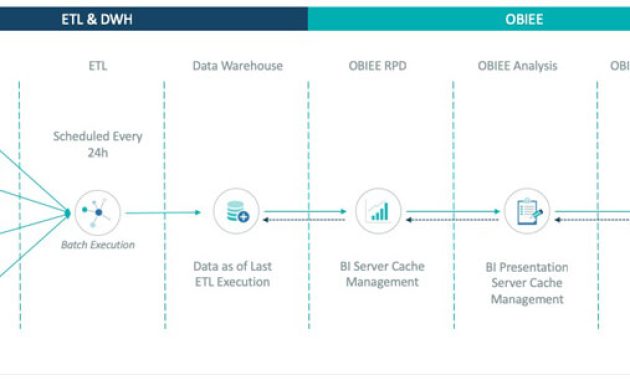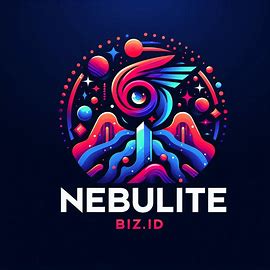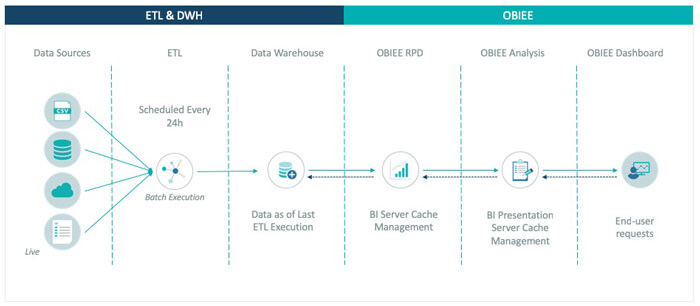
Top 7 Business Intelligence Tools To Make Faster Decisions
In today’s fast-paced business environment, the ability to make quick and informed decisions is crucial for success. Businesses are swimming in data, but without the right tools, this data remains untapped potential. Business intelligence (BI) tools are the key to unlocking this potential, transforming raw data into actionable insights. This article explores the top 7 business intelligence tools that empower organizations to make faster, data-driven decisions.
The core function of BI tools is to collect, process, analyze, and visualize data. This allows businesses to understand trends, identify opportunities, and mitigate risks. By providing a clear view of performance, BI tools enable organizations to optimize operations, improve customer satisfaction, and ultimately, boost profitability. The best business intelligence tools offer a range of features, including data integration, data warehousing, reporting, dashboards, and advanced analytics. The choice of the right tool depends on specific business needs, data volume, technical expertise, and budget.
This guide provides an overview of seven leading business intelligence tools, highlighting their key features, strengths, and potential use cases. Whether you’re a small business owner or a seasoned executive, understanding these tools can significantly improve your decision-making capabilities.
Power BI: The Microsoft Powerhouse
Microsoft Power BI is a leading business intelligence tool, known for its user-friendly interface and powerful capabilities. It allows users to connect to various data sources, create interactive dashboards, and generate insightful reports. Power BI’s strength lies in its integration with other Microsoft products, making it a natural choice for organizations already invested in the Microsoft ecosystem. With its affordable pricing and extensive features, Power BI is a popular choice for businesses of all sizes.
Key features of Power BI include:
- Data visualization: Offers a wide range of charts, graphs, and maps.
- Data modeling: Allows users to create complex data models.
- Data connectivity: Connects to various data sources, including Excel, SQL Server, and cloud services.
- Collaboration: Enables users to share reports and dashboards with colleagues.
- Natural Language Querying: Ask questions of your data using everyday language.
Power BI is a strong contender among the top business intelligence tools. Its ease of use, robust features, and competitive pricing make it a valuable asset for any organization seeking to improve its decision-making processes. It is particularly well-suited for organizations that are already using Microsoft products, such as Excel and SharePoint, due to its seamless integration.
Tableau: The Data Visualization Champion
Tableau is widely recognized for its exceptional data visualization capabilities. It empowers users to create visually appealing and interactive dashboards that reveal hidden insights within data. Tableau’s intuitive drag-and-drop interface makes it easy for users of all technical levels to explore data and create compelling visualizations. This tool excels in data discovery and exploration, allowing users to quickly identify trends and patterns.
Key features of Tableau include:
- Interactive dashboards: Enables users to create dynamic and engaging dashboards.
- Data blending: Combines data from multiple sources.
- Data visualization: Offers a wide array of visualization options.
- Mobile access: Allows users to access dashboards on mobile devices.
- Community Support: A large and active user community provides ample support.
Tableau is an ideal choice for organizations that prioritize data visualization and want to communicate insights effectively. Its focus on user experience and visual storytelling makes it a powerful tool for data-driven decision-making. Choosing the right business intelligence tools is crucial.
Qlik Sense: The Guided Analytics Leader
Qlik Sense is a powerful business intelligence tool that offers a unique approach to data analysis through its associative engine. It allows users to explore data freely and discover hidden relationships that might be missed by traditional BI tools. Qlik Sense’s guided analytics features help users navigate their data and uncover valuable insights. This tool is known for its flexibility and scalability, making it suitable for both small and large enterprises.
Key features of Qlik Sense include:
- Associative engine: Enables users to explore data freely and uncover hidden relationships.
- Guided analytics: Provides a structured approach to data analysis.
- Data storytelling: Allows users to create compelling narratives around their data.
- Mobile-friendly: Offers a responsive design for mobile devices.
- Scalability: Designed to handle large volumes of data and user traffic.
Qlik Sense is an excellent choice for organizations seeking a flexible and scalable BI solution with strong data exploration capabilities. The associative engine enables users to uncover hidden insights and gain a deeper understanding of their data. This is a great addition to the top business intelligence tools.
Looker: The Modern Data Platform
Looker, now part of Google Cloud, is a modern data platform that focuses on data governance and collaboration. It allows organizations to define a single source of truth for their data and provides a consistent view of information across the entire organization. Looker’s powerful data modeling capabilities enable users to build complex analyses and dashboards. The platform emphasizes a collaborative approach to data analysis, making it easy for teams to work together and share insights.
Key features of Looker include:
- Data modeling: Enables users to define a single source of truth for their data.
- Collaboration: Facilitates collaboration and data sharing.
- Data governance: Provides robust data governance features.
- Embedded analytics: Allows users to embed dashboards and reports into other applications.
- Scalability: Designed to handle large datasets and complex analytical needs.
Looker is a great option for organizations that prioritize data governance, collaboration, and a consistent view of their data. Its modern architecture and powerful features make it a valuable tool for data-driven decision-making. It’s one of the best business intelligence tools.
Sisense: The Embedded Analytics Specialist
Sisense is a business intelligence tool that specializes in embedded analytics. It allows organizations to seamlessly integrate analytics into their existing applications and workflows. Sisense’s focus on embedded analytics makes it easy for users to access and analyze data within the context of their daily tasks. This tool is known for its ease of use, speed, and ability to handle large datasets.
Key features of Sisense include:
- Embedded analytics: Enables users to integrate analytics into their applications.
- Data modeling: Provides powerful data modeling capabilities.
- Data visualization: Offers a wide range of visualization options.
- Scalability: Designed to handle large volumes of data.
- User-friendly interface: Easy to use and intuitive interface.
Sisense is an excellent choice for organizations that want to embed analytics into their applications and make data accessible to a wider audience. Its focus on ease of use and scalability makes it a valuable tool for data-driven decision-making. These are all important when choosing the top business intelligence tools.
Zoho Analytics: The Affordable Option
Zoho Analytics is a cloud-based business intelligence tool that offers a balance of features and affordability. It is a great option for small to medium-sized businesses (SMBs) and teams that need a cost-effective BI solution. Zoho Analytics provides a user-friendly interface, a wide range of data connectors, and powerful data visualization capabilities. It integrates seamlessly with other Zoho products, making it a natural choice for existing Zoho users.
Key features of Zoho Analytics include:
- Data connectivity: Connects to a wide range of data sources.
- Data visualization: Offers a variety of charts, graphs, and dashboards.
- Collaboration: Enables users to share reports and dashboards.
- Reporting: Provides comprehensive reporting capabilities.
- Affordability: Offers competitive pricing plans.
Zoho Analytics is an ideal choice for SMBs seeking an affordable and user-friendly business intelligence solution. Its ease of use, data connectivity, and integration with other Zoho products make it a valuable asset for any organization looking to improve its decision-making processes. Choosing the right business intelligence tools can be difficult.
ThoughtSpot: The Search-Driven Analytics Pioneer
ThoughtSpot is a business intelligence tool that leverages search-driven analytics. It allows users to ask questions of their data in natural language, making it easy for anyone to access and analyze information. ThoughtSpot’s intuitive search interface and AI-powered insights enable users to quickly uncover trends and patterns. This tool is designed to empower business users to make data-driven decisions without relying on IT or data science teams.
Key features of ThoughtSpot include:
- Search-driven analytics: Allows users to search and analyze data using natural language.
- AI-powered insights: Provides automated insights and recommendations.
- Data visualization: Offers a range of visualization options.
- Collaboration: Enables users to share insights and collaborate with others.
- Mobile access: Allows users to access and analyze data on mobile devices.
ThoughtSpot is a great choice for organizations that want to democratize data access and empower business users to make data-driven decisions. Its search-driven approach and AI-powered insights make it a powerful tool for data exploration and analysis. Understanding these top business intelligence tools is critical.
Making Faster Decisions: The Power of Business Intelligence
The ability to make faster decisions is a key competitive advantage in today’s business landscape. Business intelligence tools provide the insights and data-driven intelligence needed to make informed decisions quickly. By leveraging these tools, organizations can improve their operational efficiency, increase customer satisfaction, and gain a significant edge over their competitors. The selection of the right BI tool is crucial. The best business intelligence tools will vary depending on your needs.
The tools discussed above represent some of the top business intelligence tools available today. Each tool offers a unique set of features and capabilities, catering to different business needs and use cases. By carefully evaluating your organization’s specific requirements and considering the strengths of each tool, you can select the business intelligence solution that best empowers you to make faster and more effective decisions. Remember, the goal is to transform raw data into actionable insights. This will help you make the best decisions possible.
To make the right choice, consider factors such as data volume, data sources, technical expertise, budget, and the specific goals you hope to achieve with business intelligence. Whether you prioritize data visualization, data governance, or embedded analytics, there’s a BI tool that can help you achieve your goals. Invest in the right business intelligence tools to improve your decision-making.
Making faster decisions is no longer a luxury, it is a necessity. By implementing one of these top business intelligence tools, you can transform your organization into a data-driven powerhouse, capable of making informed decisions quickly and efficiently. This will lead to improved performance and a stronger competitive position. The right business intelligence tools will change the way you do business.
By implementing one or more of these top business intelligence tools, businesses can unlock the power of their data and make faster, more informed decisions. This will lead to better outcomes and a stronger competitive position in the market. Choosing the right business intelligence tools is key.
The choice of the right BI tool is crucial. The best business intelligence tools will vary depending on your needs. Business intelligence tools are more important than ever. Choosing from the top business intelligence tools can be daunting.
The right business intelligence tools can provide a competitive advantage. The top business intelligence tools are constantly evolving. Selecting the best business intelligence tools is an important decision. Investing in the top business intelligence tools is a smart move.
These top business intelligence tools can transform your business. Choosing the right business intelligence tools will improve your decision-making.
[See also: Related Article Titles]

